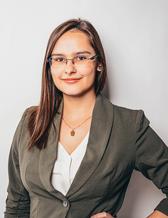From Applied Data Science to the startup world
Nathalie took her master's degree from Applied Data Science in 2019. Today, she is working as a data scientist and system administrator, building up the data team at a startup company in Germany.

– I support our teams by building dashboards that show them their most important metrics to improve their strategy and gain insights about their work and where potential improvements lie.
Nathalie studied her bachelor's degree in Applied Computer Science in Stuttgart, Germany. After her bachelor’s, she started working with data innovation – and got a deeper interest in data science.
– During my bachelor studies I got very interested in data analytics and machine learning. When I started working with data innovation, I decided that I wanted to study Applied Data Science to get a deeper insight in the many aspects the field has.
Focus on large-scale data processing
The Applied Data Science master’s programme focuses on on machine learning and data processing – and how to process, analyze and extract knowledge from very large amounts of data, what is usually called "big data".
– The master’s in Applied Data Science teaches how to process data and how to use it in machine learning and artificial intelligence. Courses from different fields can be taken, so we also learn how to apply data science projects in different fields. Ethics is a big part of the programme, it comes naturally with data privacy and security.
An interdisciplinary master's programme
The field of data science is growing explosively due to the constant digitalization of society. One of the biggest challenges is to acquire the interdisciplinary competence needed to get the most out of the data. This is why the Applied Data Science master’s programme is designed to attract students from many different disciplines.
– At Applied Data Science we programmed a lot in Python. Even though you might not come from a technical field, you learn the language by working on small tasks at the beginning and larger projects throughout the programme. In my year, there were a lot of students coming from different specialisations, like biology or economics.
A lot of support from lecturers
Nathalie highlights the close relationship with the lecturers as a clear advantage of the programme.
– You are very close to the lecturers and if you want to do a project with a company, it is usually possible. I liked that I could choose courses freely besides the mandatory courses. The programme prepares you very good for projects in the industry while also teaching academic work.
A system that allows bigger projects
The university system in Sweden is usually a bit different compared to other countries, with fewer but bigger courses each semester.
– The biggest difference is that you always have two courses during the study terms which allows you to work on bigger projects, compared to if you have three or more courses during the same period.
What are your 3 best study tips?
1. Join a study group with your friends.
2. Go to the lectures. This sounds obvious, I know, but besides the lectures there are lots of social events happening around campus that you probably wouldn’t want to miss.
3. The assignments help a lot as a preparation for exams.
New prerequisites from 2021
The prerequisites for the master's programme in Applied Data Science changed for students starting from fall 2021, making the programme more accessible to international students. The previous requirement of 15 credits programming has now changed to 7.5 credits programming and 7.5 credits mathematics. The programme begins with a 7.5 credits course in Python, to ensure that all students have equal opportunities to complete the programme.
